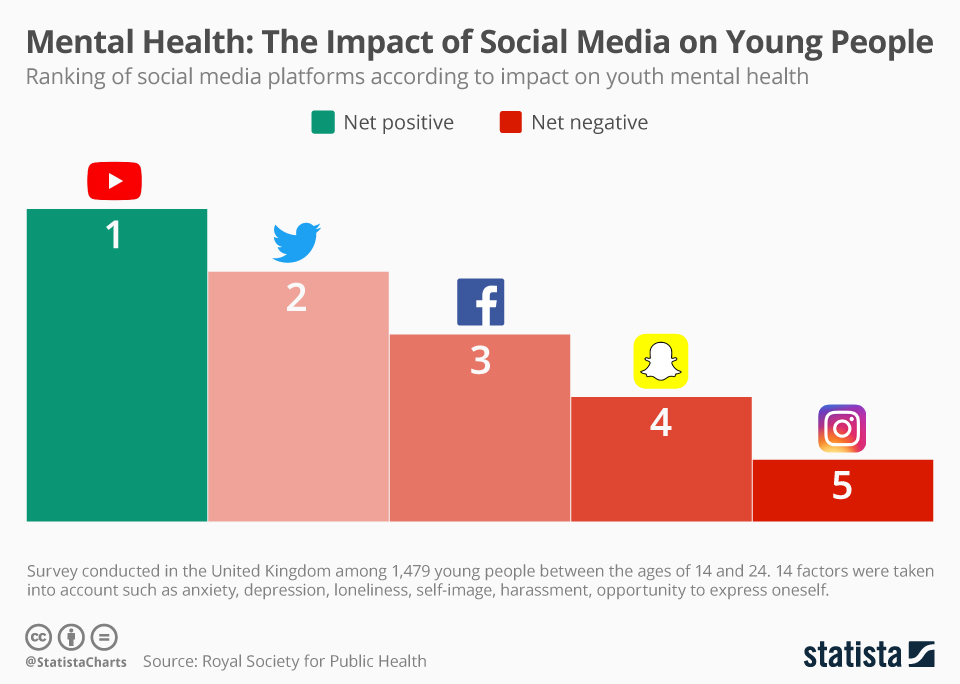Introduction
Social media has become an integral part of modern life, influencing how people connect, share, and perceive the world. Its impact on mental health is multifaceted, offering both benefits and challenges. Understanding this duality is essential for navigating the digital landscape effectively. This article explores the positive and negative effects of social media on mental health, supported by recent research and personal anecdotes.
Read More- Sleep Hygine

Positive Impacts of Social Media on Mental Health
Some positive impact of social media include-
1. Community Building and Social Support
Social media platforms enable individuals to maintain connections across geographical boundaries, fostering a sense of belonging. These connections are particularly beneficial for those who might feel isolated or marginalized. Research indicates that online communities provide emotional support and reduce loneliness (Naslund et al., 2020). Engaging in digital interactions can lead to improved mental well-being and greater social inclusion.
2. Access to Mental Health Resources and Education
Social media serves as a valuable resource for mental health education, offering coping strategies, wellness tips, and avenues for advocacy. According to a study by Pantic (2014), individuals using online platforms for mental health education reported improved coping mechanisms and awareness of available resources.
3. Enhanced Social Engagement
For older adults, regular internet use, including social media, has been linked to improved mental health outcomes. Research conducted across 23 countries found that individuals over 50 who frequently used the internet experienced reduced depressive symptoms and increased life satisfaction compared to infrequent users (Chopik, 2016). This suggests that digital engagement can enhance social interaction and combat loneliness among seniors.
Negative Impacts of Social Media on Mental Health
Some negative impacts of social media include-
1. Anxiety and Depression
Excessive engagement with social media has been linked to increased levels of anxiety and depression. The constant exposure to curated portrayals of others’ lives can lead to negative social comparisons and diminished self-esteem. A study by Hunt et al. (2018) found that limiting social media use to 30 minutes per day resulted in decreased levels of loneliness and depression among university students.

2. Exposure to Negative Content
Engaging with negative online content, such as doom-scrolling or participating in contentious discussions, can create a detrimental feedback loop, exacerbating feelings of distress. Research suggests that exposure to distressing online material significantly deteriorates mood, yet individuals experiencing negative emotions often continue to seek such content, perpetuating their distress (Beyens et al., 2021).

3. Cyberbullying and Online Harassment
The anonymity afforded by social media can sometimes lead to cyberbullying and online harassment. According to Pew Research Center (2022), 64% of American young adults (18-29) have experienced cyberbullying. Such experiences can contribute to chronic stress, anxiety, and depression.
4. Personal Anecdote
Consider the story of Anna, a teenager who began using social media at thirteen. Initially, she found joy in connecting with friends online. However, over time, she became increasingly isolated, spending excessive hours on social platforms. Her exposure to harmful content and the pressures of online interactions contributed to heightened anxiety and depression. Ultimately, she required professional mental health intervention. Anna’s experience underscores the profound impact social media can have on mental health, particularly among adolescents.
Navigating Social Media for Mental Well-being
To harness the benefits of social media while mitigating its drawbacks, consider the following strategies:
- Mindful Engagement: Be conscious of your social media usage patterns. Limit time spent online and ensure that interactions are purposeful and positive.
- Curate Your Feed: Follow accounts that inspire and uplift. Unsubscribe from content that induces stress or negative comparisons.
- Digital Detox: Regularly take breaks from social media to reconnect with the offline world and reduce digital fatigue.
- Seek Support: If social media is negatively impacting your mental health, consider reaching out to mental health professionals or support groups for guidance.
Conclusion
Social media’s influence on mental health is complex, encompassing both positive and negative aspects. By approaching these platforms with intentionality and awareness, individuals can cultivate a balanced relationship with social media, leveraging its benefits while safeguarding their mental well-being.
References
Beyens, I., Pouwels, J. L., van Driel, I. I., Keijsers, L., & Valkenburg, P. M. (2021). The effect of social media on well-being differs from adolescent to adolescent. Scientific Reports, 11(1), 1-11. https://doi.org/10.1038/s41598-021-88767-8
Chopik, W. J. (2016). The benefits of social technology use among older adults are mediated by reduced loneliness. Cyberpsychology, Behavior, and Social Networking, 19(9), 551-556. https://doi.org/10.1089/cyber.2016.0151
Hunt, M. G., Marx, R., Lipson, C., & Young, J. (2018). No more FOMO: Limiting social media decreases loneliness and depression. Journal of Social and Clinical Psychology, 37(10), 751-768. https://doi.org/10.1521/jscp.2018.37.10.751
Naslund, J. A., Aschbrenner, K. A., Marsch, L. A., & Bartels, S. J. (2020). The future of mental health care: Peer support and social media. Epidemiology and Psychiatric Sciences, 29, e130. https://doi.org/10.1017/S204579602000063X
Pantic, I. (2014). Online social networking and mental health. Cyberpsychology, Behavior, and Social Networking, 17(10), 652-657. https://doi.org/10.1089/cyber.2014.0070
Pew Research Center. (2022). A majority of teens have experienced some form of cyberbullying.
Subscribe to PsychUniverse
Get the latest updates and insights.
Join 3,045 other subscribers!
Niwlikar, B. A. (2025, March 30). Effects of Social Media Use and 4 Important Ways to Navigate It. PsychUniverse. https://psychuniverse.com/effects-of-social-media-use/



